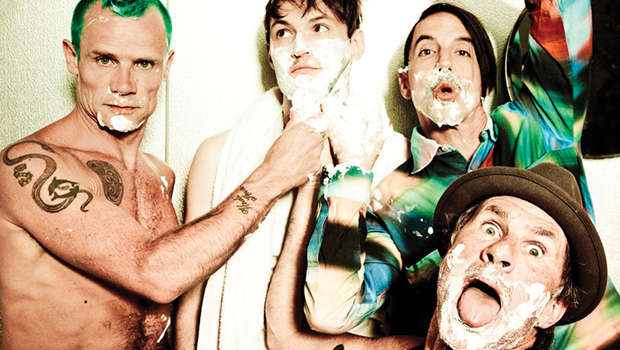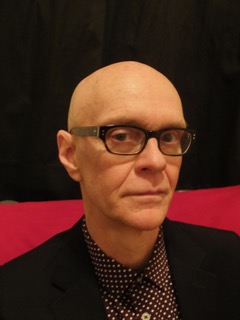Interview: Guitarist Josh Klinghoffer on the New Red Hot Chili Peppers Album, 'I'm With You'

This is an exclusive interview with new Red Hot Chili Peppers guitarist Josh Klinghoffer. For more Red Hot Chili Peppers -- including an interview with Flea, Anthony Kiedis and Klinghoffer -- check out the October issue of Guitar World magazine, which is available right here.
While guitarist Josh Klinghoffer just joined the Red Hot Chili Peppers late in 2009, he was already a member of the band’s extended family.
An LA native, he’s known all the Chili Peppers for years and is a particularly close friend of out outgoing RHCP guitarist John Frusciante, having contributed to numerous Frusciante solo and side projects. A seasoned studio rat and road dog at the relatively young age of 31, Klinghoffer’s distinctive guitar style imparts a dazzling palette of colors and moods to the Chili Pepper’s new album, I’m With You.
GUITAR WORLD: How did you first get into playing guitar?
I started playing drums when I was 9. Played them for a long time and just wanted to play guitar.
How old were you when you finally did start on guitar?
Fifteen. I didn’t start till later on. I dropped out of high school and started playing guitar.
Get The Pick Newsletter
All the latest guitar news, interviews, lessons, reviews, deals and more, direct to your inbox!
Who really mattered to you when you started playing?
Naturally, Jimi Hendrix, Jimmy Page kind of playing on the one hand. And then Johnny Marr, Robert Smith and people like that. John Frusicante is one of my favorites. I just figured out anything and everything I could. Punk, Sex Pistols, Germs. When I was younger, I went back to that stuff. I was always more of a chordal, textural kind of textury player.
How and when did you first meet John Frusciante?
I met him in January of '97. He and Flea were playing a gig with Thelonius Monster. And my best friend’s sister was dating Bob Forrest. So I went along to the show. That’s how I first met Flea and John. I think I offered my drumming to them. John and I didn’t become friends until a couple of years later. He had already rejoined the Red Hot Chili Peppers by then. I was making a record with the Bicycle Thief and John came and did a solo on the record. We started hanging out. I’d go over his house and listen to records. So we started becoming friends around 1999.
What’s the single most important thing you learned about any aspect of the guitar from John?
I consider him someone who plays from the deepest part of who he is as a human being and whatever he’s experiencing at that specific point in time, whether it’s playing a solo, a rhythm part, a sonic texture or playing any instrument. That’s something I’ve picked up from him, and I’ve been privileged to do with him. Just as a person and a friend, he’s been an incredible influence on me.
A lot of your work in the past has been avant garde, underground kind of stuff. What’s it like to step into a band like the Chili Peppers, which is much more in the mainstream?
I’ve spent the last decade touring with artists like Beck and PJ Harvey. So I’m no stranger to a bigger audience. The big change is having it be a band that I’m considered a member of. And yet it feels really natural. There was a period when I was touring with people and I kind of swore off that because I needed to focus on my own writing and my own band, which I hadn’t put together yet. But I finally did, right before playing with the Chili Peppers. Then the Chili Peppers asked me to go on tour with them, and I said, “God, you can’t say no to that.” And then it turned out I had an offer to be in the band.
Your own band is named Dot Hacker?
Yeah. A name no one likes. It’s our drummer’s grandmother’s name: Dorothy Hacker, or Dot Hacker.
It sounds like a computer thing ...
Totally, but not really. We just picked that and it stuck. There’s a couple of songs of ours online. A whole record will come out, hopefully, soon.
How did songwriting work for the new Chili Peppers album? Were there a lot of pre-formed ideas you all brought in? Or did it grow more out of jamming? What was the ratio of those two things?
There was a very even ratio of those two things — a lot of very collaborative work. “I have a part. Here’s the chorus, you do the verse.” A lot of equal jamming as well. I remember that the bridge for “Monarchy of Roses” just came out of Chad going nuts on the drums and us keeping up. Then Flea told me, “I think you should come up with an outro right now.” And the outro on you hear on the record is the first thing I came up with.
You’ve got a great chordal sensibility. It’s sort of jazzy. Is that a kind of music that you’re really into?
I love jazz. I’ve always been into chords, structuring chords. There’s nothing better than a simple chord progression that’s hard to do. I try to make it somewhat off the wall.
What was it like recording I’m With You at East West in Hollywood?
Great. It’s the old Ocean Way Studio where a lot of great records were made. But now it’s owned by East West, which is a sample library company. They have a functioning office. People were trying to conduct business while Flea and I were banging on the piano.
Was making the album your first encounter with [producer] Rick Rubin?
Yes — I mean professionally. I’d met him before. Something that was a little strange for me was obviously that all these guys had a long working relationship with him, whereas I hadn’t. But they couldn’t have been any more welcoming.
You’re quite a bit younger than the other guys in the band. How does the age difference play out?
It’s not something we think about, really. But yeah, I grew up and was shaped musically by listening to them and to the people they listened to and who inspired them to get started. And I still learn tons from them. I always get embarrassed. They’ll say, “You mean you never heard Defunkt?” And I have to say no — outside of reading about a band like that in magazine like we’re talking for now.
What kind of preparations are you making to tour with the Chili Peppers for this new album?
Really just playing guitar as much as possible. Learning their amazing and immense back catalog. I told myself for this whole year and a half that I’ve been in the band that I should learn a song a day. Because there’s so much. As we’re getting the live thing going, I have to cover a lot of John’s soloing. And he’s such a dexterous, amazing guitar player in that way. I know it will take me a minute to find the middle ground between doing what I’m comfortable doing and not feeling like there’s something missing that’s supposed to be there.
In the past, I’ve really concentrated on writing chord progressions songs and lyrics rather than my chops as a guitar player. I haven’t focused on that in a long time. But playing in this band has made me do it again. It’s been fun getting out the Zeppelin and Hendrix — stuff that’s a little more textrous. Soloing is not something that comes naturally to me. Never did. I’m very much more sound-oriented. Step on a pedal and get something cool.
I'm With You, the new album by Red Hot Chili Peppers, will be released Aug. 30 via Warner Bros. Be sure to check out the October issue of Guitar World magazine, featuring Anthony Kiedis and Josh Klinghoffer on the cover. It's available here.
In a career that spans five decades, Alan di Perna has written for pretty much every magazine in the world with the word “guitar” in its title, as well as other prestigious outlets such as Rolling Stone, Billboard, Creem, Player, Classic Rock, Musician, Future Music, Keyboard, grammy.com and reverb.com. He is author of Guitar Masters: Intimate Portraits, Green Day: The Ultimate Unauthorized History and co-author of Play It Loud: An Epic History of the Sound Style and Revolution of the Electric Guitar. The latter became the inspiration for the Metropolitan Museum of Art/Rock and Roll Hall of Fame exhibition “Play It Loud: Instruments of Rock and Roll.” As a professional guitarist/keyboardist/multi-instrumentalist, Alan has worked with recording artists Brianna Lea Pruett, Fawn Wood, Brenda McMorrow, Sat Kartar and Shox Lumania.
“Even the thought that Clapton might have seen a few seconds of my video feels surreal. But I’m truly honored”: Eric Clapton names Japanese neo-soul guitarist as one to watch
“You better be ready to prove it’s something you can do”: Giacomo Turra got exposed – but real guitar virtuosos are being wrongly accused of fakery, too











